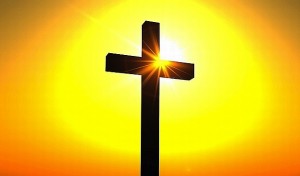'We are a ship’s company, even if there are times when we’d dearly like to make some of the crew walk the plank…'
A talk by Malcolm Doney on Sunday April 17th.
Ahoy there, shipmates! It’s very good indeed to be back here in the nave of St Luke’s. It feels like home. Meryl and I have been attached to the place for over 25 years, so it’s faaaamly.
There’s a reason I mentioned the nave. It’s because the word comes from the Latin ‘Navis’ which means ‘Ship’. If you look above your heads for a minute, and use your imagination, you could see that this might be the inside of an upturned hull of a boat. This isn’t a particularly good example, but it’s very obvious in many churches.
That’s because there’s an enduring tradition which sees Noah’s ark as an emblem of salvation. Here we all are gathered into a floating zoo, tucked up safe and dry from the terrible storms raging outside, and bound for an eternal landfall. We’ve been excused from the terrible judgment of God, imposed on the wicked people that surround us.
This metaphor, rather like Noah’s ark, creaks a bit. Doesn’t entirely hold water, but we’ll come back to that.
First, let’s do a short “Previously on Noah” to set the scene. Life on earth after Adam and Eve were hoofed out of the Garden of Eden, got pretty wild. In the course of just two chapters in Genesis, Adam and Eve’s descendants built cities, discovered how to use of bronze and iron, and developed cultures with art and music,
Then it gets all a bit Game of Thrones. The planet becomes dominated by a series of figures, who are possibly interchangeable, referred to as “sons of God” and the Nephilim. Maybe they’re fallen angels, but, anyway, they arrive on earth, and have sex with human women who then give birth to a superhuman race of giants or “men of renown”. There may have been women of renown too, but this isn’t recorded. I love the Old Testament! It has the best stories.
(Old-timers in the congregation might recall the Fields of the Nephilim, an 80s Gothic Rock outfit . . . from Stevenage. Where else?)
Anyway, violence and evil is the order of the day. And God curses the day he made humankind and decides to “blot them out” – all except Noah who is a beacon of goodness.
This story forms part of a pattern in Genesis. There are three times when God despairs of his creation and decides to start again: Adam and Eve’s disobedience, followed by expulsion from Eden; the evil and violence of this dark period, followed by the flood, and then the Tower of Babel followed by the fragmentation of language. If you remember, this last one was when humans, post-Noah, who all spoke the same lingo, started to build a huge tower in their own honour. God thought people were getting too powerful for their own good, and decided to fragment their language and scatter them abroad.
But the story of Noah is the most dramatic and the most draconian. This is not a nice Sunday School story. God is so remorseful, in such despair, that he is prepared to destroy his creation – to kill all but eight individuals on the entire planet. Forget “The animals went in two by two, the elephant and the kangaroo, Hurrah, Hurrah.” This is genocide.
God, the story goes, wants to start again, with a bunch of people who are prepared to do what they’re told. As it happens, things go wrong shortly after the ark has landed. Noah goes on a drunken bender, which involved unseemly nakedness, and the cursing of generations to come.
What kind of God is this? We have to realise that these early Genesis stories forged as part of a defining myth that was largely put together when the Israelites found themselves wrenched from their Promised Land, and exiled in Babylon. This ragged, migrant community were clinging on to their identity and wondering how they – God’s chosen people – had ended up, surrounded by their enemies.
It was hugely important for them to see their God as someone who intervened, who rescued. He had saved them before, and would save them again. It’s easy to get the idea from the Old Testament of a genocidal God, who despaired of his creation. But these characteristics were a by-product of a desire by a despairing people for a deity who would take their side against the playground bullies. The danger is that God looked like an old bastard. But he at least he was their old bastard.
Elements of the story of Noah’s ark were borrowed from Israel’s new Babylonian neighbours. There was another boat-builder called Utnapishtim who had escaped a similar flood in the Epic of Gilgamesh, a Mesopotamian narrative, written a thousand years or more before. His ark may have been a giant circular coracle, two-thirds the size of a football pitch. The Israelites made parts of this epic their own, and gave it a different theological spine. The story fitted their lived experience, in a fertile crescent where flooding was a regular feature.
Stories like these had deep personal resonance. They still do. I began by saying that the ark, in the life of the church became a symbol of the saved. We have been rescued from the sinful world, transported through the waters of baptism and into a brave new world. And at times in the past – when Christians were a persecuted minority, this might have been watertight.
I remember, when I first started coming to St Luke’s in the 1990s, this was a kind or ark for many people who had fled their evangelical past, under the impression that they’d lost their faith, and they need to replace it with a new one. It was a place of safety – it may still be for some of you. But I’d suggest that we are no longer in exile to the same degree. This is not St Luke’s contra mundum. We don’t need a lifeboat, we need to be in the swim.
But there’s still a sense in which being part of a faith community feels like it might have been like for Noah’s family. The novelist and priest Frederick Buechner describes it better than I can:
“Just about everything imaginable is aboard, the clean and the unclean both. They are all piled in together helter-skelter, the predators and the prey, the wild and the tame, the sleek and beautiful ones and the ones that are ugly as sin. There are sly young foxes and impossible old crows. There are the catty and the piggish and the peacock-proud. There are hawks and there are doves. . . Most of them have no clear idea just where they’re supposed to be heading or how they’re supposed to get there or what they’ll find if and when they finally do . . . It’s a regular menagerie in there, and sometimes it smells to high Heaven.”
The Church Universal is hardly a happy ship right now. There are disputes over sexual orientation, sexual practice, the position of women, abortion. There’s vitriol, judgment and phobia. I don’t know about you, but often I find myself spiritually, and ethically, closer to people who profess no faith, than those who profess mine.
There is another nautical image which comes to mind when I think of Christendom, and that’s the Ship of Fools. It’s a parable invented by Plato, and also the name of a Christian satirical website dear to my heart. The ship of fools is a vessel whose control has been wrested from the pilot, by those who know nothing of sailing and have zero navigational skills. Sound familiar?
I’m guessing that for a lot of us – when it comes to issues of life and faith – often find ourselves at sea. Even if we’re not totally at the mercy of the elements, we’re still buffeted by a shifting weather and sea conditions – relationships, career, finance, physical health and mental state all affect us.
But we aren’t sealed into a vessel by an interventionist God, who’s micromanaging our universe. Unlike Noah and his menagerie, we’re not just passengers. That has terrifying echoes of Syrian refugees packed into second-rate vessels with inadequate food and safety equipment – abandoned by the crew – and left to fend for themselves. God help them.
But we do know that – on a stormed tossed boat – you need shipmates. We haul on the ropes together, sing the old shanties, retell the old stories, keep a weather eye on each other. On a fair day, we watch the mainsail fill with a following wind. We are a ship’s company, even if there are times when we’d dearly like to make some of the crew walk the plank.
Alongside Noah’s Ark, and the Ship of Fools, there’s a third maritime image that I find affecting and helpful. The disciples are in a fishing boat on the sea of Galilee. Jesus is with them, but he’s asleep in the stern. Out of nowhere, a gale blows in, with the waves rising steep and the wind howling in the rigging. Even these seasoned fishermen are scared.
But they are not alone. They’re in the company of the unflappable, figure of Jesus, who stills their fears and calms the waves. His presence, his character, his life binds them together. He’s not the skipper, or the navigator. The disciples, the ships company – us – decide among ourselves who does what. In collaboration, in prayer, we make our decisions, we raise the sails and set the course. We manage our own destiny. But we do so through our trust in this remarkable figure who has demonstrated to us that God is not Noah’s old bastard, who steers the ship by remote control, but someone who is in the same boat, in the same sea, in the same wind, and who also waits for us ashore with the fire lit, and breakfast cooking
Bon voyage.






